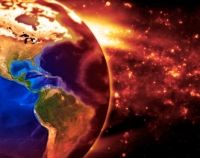

Scientists have said that July equalled, and may have possibly beaten the hottest month seen on record.
All across the world, we saw the entire month surpassing the hottest month that was available on record, at least equal to the highest temperatures we have seen. This, revealed by the World Meteorological Organisation, has followed the hottest June on record. Scientists have calculated that the one-in-a-thousand-year event was made 100 times more likely by human-driven climate change.
Usually the extreme heat is associated with and expected by the El Niño year, the phenomenon often grouped with prolonged temperature surges, but this is not one. Scientists instead suggest that it has been driven to a large extent by the carbon emissions from car exhausts, chimney emissions in power plants, burning forests and other human sources.
It was found that the extreme heat in both the Netherlands and France, where temperatures reached above 40°, were made at least 10 times, and possibly over 100 times more possible as a result of climate change. The entirety of the UK saw the impact of climate change as being two to three more times likely to have affected the heat, in fact the studied locations would have seen a 1.5 to 3° difference if there was no effect from climate change.
While temperature records were broken in many countries, there was also the associated impacts to think about. Wildfires devastated vast areas of Siberia, the Greenland ice sheet is melting at a nearly record rate, and the risks of drought occurring has grown more acute across wide areas of Central and Eastern Europe.
However these records will not stand, as it is highly likely they will be beaten in a couple of years. This extreme heat will have an impact on human beings, with effective heat emergency plans, and accurate weather forecasts being crucial to reduce and anticipate possible risks.
The UN secretary general, António Guterres has said the seasons are moving alarmingly far from their usual path. "We have always lived through hot summers, but this is not the summer of our youth. This is not your grandfather’s summer”.
"Preventing irreversible climate disruption is the race of our lives, and for our lives. It is a race that we can and must win".
The five year period of 2015-19 is expected to be the warmest ever, with the World Meteorological Organisation's secretary general, Petteri Taalas saying, "unprecedented wildfires raged in the Arctic for the second consecutive month, devastating once pristine forests which used to absorb carbon dioxide and instead turning them into fiery sources of greenhouse gases. This is not science fiction. It is the reality of climate change. It is happening now and it will worsen in the future without urgent climate action".